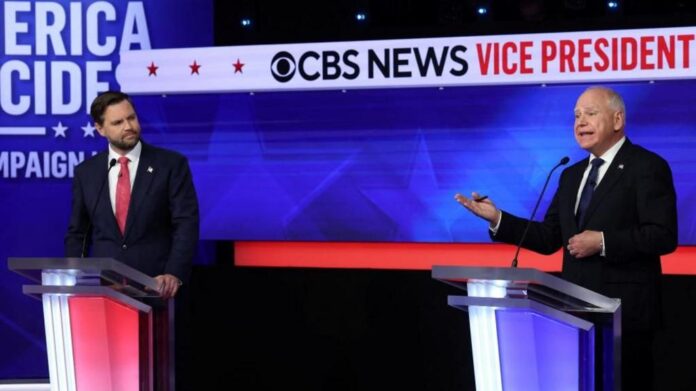By Aaior K. Comfort
New York City, October 2, 2024 In a surprisingly civil vice presidential debate held on October 1, 2024, Republican candidate J.D. Vance and Democratic candidate Tim Walz faced off on pressing issues such as migration, abortion, and foreign policy. Despite the heated atmosphere surrounding the presidential race, the debate, hosted by CBS News, largely avoided the personal attacks characteristic of the prior presidential debate between Donald Trump and Kamala Harris.
Vance and Walz concentrated on policy discussions, but the influence of their respective running mates loomed large. Walz criticized Trump as a threat to democracy and questioned his fitness to lead on the global stage. Conversely, Vance defended Trump, focusing his attacks on Harris’s record concerning economic issues and illegal migration, which he attributes to the Biden administration.
A pivotal moment arose when Vance sidestepped a direct question regarding his support for Trump’s unfounded claims about the 2020 election results. Walz labeled Vance’s noncommittal response as “damning” and seized the opportunity to condemn Trump for the January 6 Capitol attacks.
Tension escalated during discussions about migration, where Vance’s microphone was temporarily muted while moderators fact-checked his statements. Walz accused Vance and Trump of spreading harmful misinformation about migrants, stating it “dehumanizes and villainizes” them.
The debate also touched on the contentious issue of abortion, following the Supreme Court’s 2022 decision to overturn the national right to abortion. Vance criticized Democrats for adopting what he described as a “very radical pro-abortion stance,” while Walz defended his position by asserting he was “pro-women.”
Despite their stark ideological differences, both candidates maintained a respectful demeanor, often acknowledging their common ground. The two men, who both hail from Midwestern roots, shook hands before and after the debate, suggesting a mutual respect.
As the candidates tackled the ongoing crisis in the Middle East following Iran’s missile attacks on Israel, Walz criticized Trump’s foreign policy, pointing to his connections with Russian President Vladimir Putin and the withdrawal from the 2015 Iran nuclear deal. Vance countered that Trump had brought stability to the global landscape.
Trump himself took to social media after the debate, praising Vance’s performance and asserting, “GREAT JOB JD — We will MAKE AMERICA GREAT AGAIN!”
While history indicates that vice-presidential debates rarely alter the course of elections, the current campaign climate—especially with Harris stepping in for President Biden—could lend this debate additional significance. Vance and Walz are both military veterans with blue-collar backgrounds, each presenting themselves as the voice of swing states crucial to the upcoming election.
Vance, known for his controversial remarks, continues to draw attention for his sharp criticisms of Democrats, while Walz has gained favor among progressives for his bold stance against Vance and Trump. As the November 5 election approaches, the stage is set for a fierce contest.

